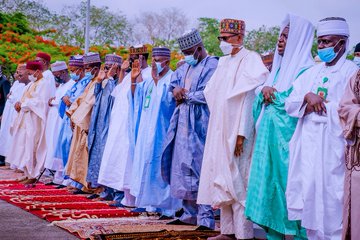News
Eid-el-Fitr: Imam wants Nigerians to pray against extremism

Muslims in Nigeria on Monday joined their counterparts around the world to mark the Eid-El-Fitr – signalling the end of the fasting month of Ramadan.
Eid-El-Fitr means “festival of breaking the fast” and celebrations would normally begin, depending on the sighting of the moon.
The event is quite different this year from those of 2020 and 2021 which were celebrated lowkey amid measures to curb the spread of COVID-19.
This year’s celebration coincides with the commemoration of the annual international Workers’ Day, and many would have expected the government to declare three days as public holidays.
President Muhammadu Buhari on Monday joined other Muslim faithful at the parade ground of the Mambila Barracks, Abuja, to perform the Eid-el-Fitr prayer.
Buhari was accompanied by some of his family members and personnel aides, arrived at the venue of the event at about 9.00 a.m.
Others at the praying ground included some members of the Federal Executive Council, security chiefs, heads of para-military organisations and government officials.
The two-raka’at prayer was led by the Chief Imam of the Barracks, Muhammad Dahey-Shuwa, who spoke on the significance and spiritual values of the just concluded Ramadan fast.
Dahey-Shuwa, in his sermon, also prayed for peace and stability of the country, calling on citizens to continue to pray and support the nation’s security agencies in their fight against terrorism and violent crimes across the country.
President Buhari, who briefly responded to questions after the prayer session, admitted to be having sleepless nights over the security situation in parts of the country.
He, however, promised to spare no efforts at dealing decisively and mercilessly with the criminal gangs.
On the forthcoming general elections, the president reaffirmed the commitment of his administration to free, fair and transparent process.
The president had throughout the period of the Ramadan joined the Muslim faithful at the State House Mosque in the interpretation of the Qur’an (Tafsir)
The President, who participated in the daily exercise, had also used his evenings to host guests from cross sections of the country to Iftar (breaking of fast).
Malam Garba Shehu, the President’s Senior Special Assistant on Media and Publicity, had in a statement in Abuja, said the President used the occasions to practise the values projected by the Ramadan.
These, according to him, include the promotion of discipline and personal sacrifice, care and love for less fortunate, promotion of national unity and support for the Armed Forces as they strive to end terrorism and other crimes in the country.
Monday’s Eid prayer was the first time the President would be observing the session outside the Presidential villa since the outbreak of the COVID 19 pandemic, two years ago.






